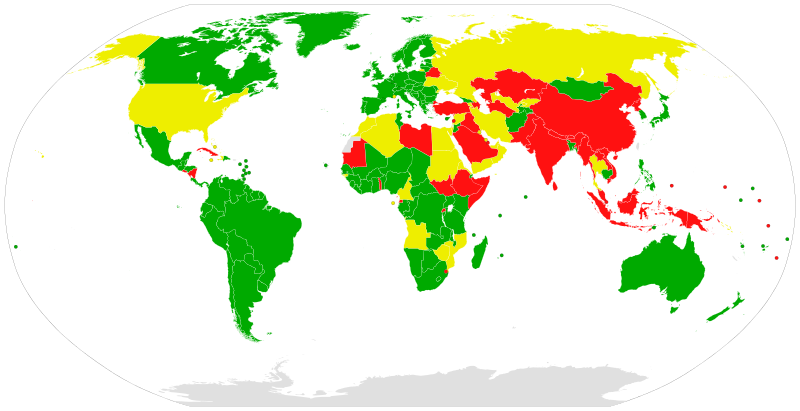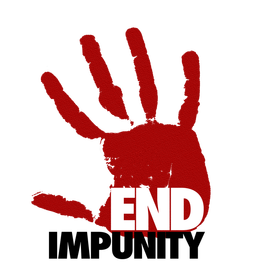The Rome Statute
|
The 1998 treaty establishing the International Criminal Court outlines the operation and goals of the ICC, emphasizing provisions that ensure fair trials.
"Most serious crimes of concern to the international community as a whole must not go unpunished and that their effective prosecution must be ensured by taking measures at the national level and by enhancing international cooperation" - Preamble to the Rome Statute |
KEY: Green: Member States Yellow: Signed but not Ratified Red: Neither Signed nor Ratified |
|
Matias Hellman explains the objective of the court
(Inside the International Criminal Court) |
GoalsThe ICC's main aim is to bring about peace through holding those dangerous to it accountable and fulfill the international community's responsibility to hold those guilty of crimes of aggression and crimes against humanity accountable for their actions, ending impunity of world leaders and bringing corrupt political figures to justice. |
"The International Criminal Court, with independent prosecutors putting tyrants and torturers in the dock before independent judges, reflects a post-war aspiration come true." - Lawyer and Professor of Law Cherie Booth
Criticism & Challenges
|
The most common criticism is that the ICC poses a threat to state sovereignty; this is the reason cited by major UN powers Russia, China, and the United States in their refusal to join. Most ICC cases have involved African criminals, which some argue is a result of European bias against African countries. “The court has transformed itself into a political instrument targeting Africa and Africans. This unfair and unjust treatment is totally unacceptable” - Tedros Adhanom Ghebreyesus, Ethiopian Foreign Minister |
Political cartoon criticizing the ICC's focus on African criminals
(The Cartoon Movement) |
The Responsibility to Protect (R2P)In 2005, the United Nations adopted the "Responsibility to Protect" (R2P) standard, giving the international community the responsibility to intervene in the case of severe human rights violations. Since, the Security Council has referred many R2P cases to the ICC for prosecution, a manifestation of the IMT's goal for the international community to take on the responsibility to address human rights violations in legal terms.
"In order for the international community to truly progress towards actualizing the refrain of 'never again,' a multifaceted approach is required: the international community must act to collectively promote the universal acceptance of the RtoP norm, and in addition, states need to support and assist the ICC. Together these components of international law and international relations produce a comprehensive foundation of deterrence and justice, and provide a basis upon which RtoP can realize the transition from concept to practice." - The International Coalition for the Responsibility to Protect
|
"The international community, through the United Nations, also has the responsibility to use appropriate diplomatic, humanitarian and other peaceful means [...] to help to protect populations from genocide, war crimes, ethnic cleansing and crimes against humanity. In this context, we are prepared to take collective action, in a timely and decisive manner, through the Security Council [...] on a case-by-case basis and in cooperation with relevant regional organizations as appropriate, should peaceful means be inadequate and national authorities are manifestly failing to protect their populations from genocide, war crimes, ethnic cleansing and crimes against humanity." - UN Resolution 60/1Anne-Marie Slaughter, professor of International Affairs, on the R2P
(The Foreign Policy Association) |
An Eye to the Future: Law for All the World
|
The ICC marks countries taking on the responsibility to protect human rights through the rule of law. |
"The spirit of the Nuremberg Principles is more alive today than since the event of their first realization."
|
|
The ICC hopes to gain American, Chinese, and Russian support, and is working toward major world powers being held responsible for breaches of international law.
"The laws of war do not apply only to the suspected criminals of vanquished nations. There is no moral or legal basis for immunizing victorious nations from scrutiny. The laws of war are not a one-way street." - IMT Prosecutor Telford Taylor |


